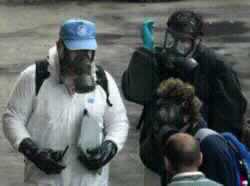U.N. weapons inspectors scoured more sites in Iraq Saturday in search of weapons of mass destruction as the United States ordered nearly 35,000 more troops to the Gulf for a possible war. The U.N.'s nuclear watchdog, overseeing the laborious arms inspections, has called on the United States to provide more specific intelligence to help in the search for any banned weapons.
The appeal came Friday from Mohamed ElBaradei, head of the International Atomic Energy Agency (IAEA), while top officials in Europe spoke out against a rush to war on the basis of inconclusive weapons inspections.
"Without proof, it would be very difficult to start a war," European Union foreign policy coordinator Javier Solana said.
Friday's order by Defense Secretary Donald Rumsfeld to send thousands more troops to the Gulf was the biggest since the Pentagon began a very public surge of troops and forces in recent weeks.
The aim was to more than double the 60,000 U.S. troops now in the Gulf region while President Bush decides whether to order an invasion of Iraq over alleged weapons of mass destruction.
REQUEST FOR INTELLIGENCE
ElBaradei met with national security adviser Condoleezza Rice at the White House Friday and later at the State Department with Secretary of State Colin Powell .
The meetings came a day after ElBaradei and his colleague Hans Blix, chief of the U.N. Monitoring, Verification and Inspection Commission (UNMOVIC), told the U.N. Security Council there were no "smoking guns" to prove Iraq had chemical, biological or nuclear weapons.
Iraq denies it has any banned weapons. But Washington says it does and that if Iraq continued to deceive, it would again be in "material breach" of Council resolutions -- language that could mean war.
"We need more actionable information," ElBaradei told reporters in Washington after briefing members of Congress.
"We have a good process of a dialogue with the United States and with other intelligence agencies and I hope in the next few weeks...we'll get additional information that can accelerate our job in the field."
With the world's eyes turning to North Korea , which has admitted developing nuclear weapons and pulled out of the Non-Proliferation Treaty, U.S. officials insisted Iraq posed a major threat, however little the inspections found.
Iraqi officials said teams from UNMOVIC and the IAEA drove Saturday to five sites in central Iraq.
An UNMOVIC biological team inspected two state companies for drugs and medical appliances in the capital. A chemical team headed to an undisclosed location north of Baghdad.
A missile team visited Ibn Seena missile facility in Tarmiyah north of Baghdad. An IAEA team was at al-Amiriyah site in Falluja.
TROOPS ON THE MOVE
The U.S. ground forces ordered to deploy so far are substantially short of the more than 250,000 sent to the region for the Gulf War but the current shift could grow more rapidly in January and February.
Britain is also mobilizing its forces alongside the Americans despite grave doubts within Prime Minister Tony Blair 's Labor party.
The bloc's other main military power, France, is cooler, insisting on an international mandate for any war. Germany opposes outright the idea of attacking Iraq.
Greek Foreign Minister George Papandreou, who will lead a European Union mission to the Middle East, said Europe was not as divided over Iraq as some people suggested.
NATO , meanwhile, could begin formal discussions in the next few weeks on whether to play a supportive role in any military campaign against Iraq, a senior State Department official said Friday.
The United States has already proposed such a role for the 19-nation alliance in the event of war, suggesting options such as providing a missile defense of southern Turkey and deploying NATO's collective AWACS radar planes, patrol ships and minesweepers.
At a Friday news conference in Brussels, NATO Secretary-General George Robertson made only a fleeting reference to the possibility of war with Iraq by affirming NATO's endorsement of the United Nations resolution that gives Baghdad a last chance to disarm.
PHOTO CAPTION
U.N. weapons inspectors wearing protective suits and gas masks prepare to enter a drugs and medical appliance company on the outskirts of Baghdad January 11, 2003. Weapons inspectors scoured more sites in Iraq Saturday in search of weapons of mass destruction as the United States ordered nearly 35,000 more troops to the Gulf for a possible war. (Peter Andrews/Reuter
- Author:
& News Agencies - Section:
WORLD HEADLINES


 Home
Home Discover Islam
Discover Islam Quran Recitations
Quran Recitations Lectures
Lectures
 Fatwa
Fatwa Articles
Articles Fiqh
Fiqh E-Books
E-Books Boys & Girls
Boys & Girls  Women
Women










